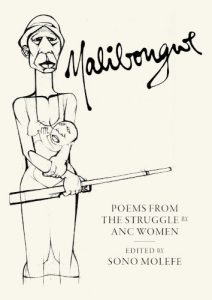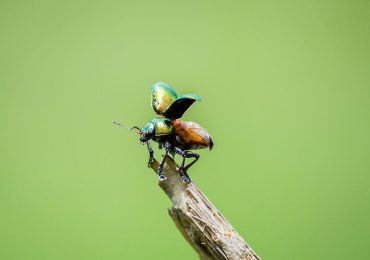The JRB presents an excerpt from Malibongwe: Poems from the Struggle by ANC Women—a new edition of a lost piece of South African literature.
The book was originally published throughout Europe during the nineteen-eighties, but was banned in South Africa by the apartheid regime. This is the first South African edition of Malibongwe, a book four decades in the making, which re-establishes a place for women poets in exile in the artistic history of the Struggle.
The legendary artist Dumile Feni contributed a number of illustrations to the second German edition of Malibongwe, but these works were until recently unknown to Feni scholars, and even his own family. The book’s publisher uHlanga Press managed to recover copies of the images to add to the archive of known Feni works, and the artist’s estate granted permission for one of the images to be printed on this edition’s cover (see below).
The book was made possible by ‘Recovering Subterranean Archives’, a project that seeks to repatriate and republish South African culture from exile, headed by Uhuru Phalafala of Stellenbosch University, and funded by Andrew Mellon.
Scroll down to read a selection of poetry by Lindiwe Mabuza—who under the nom de guerre Sono Molefe championed the Malibongwe book project—Baleka Kgositsile (now Baleka Mbete) and Lerato Kumalo (the pseudonym of S’bongile Mvubelo).

Malibongwe: Poems from the Struggle by ANC Women
Edited by Sono Molefe
uHlanga Press, 2020
Read an excerpt from the Introduction, written by academic, poet and JRB Patron Makhosazana Xaba:
‘What does it mean to giggle at the wrinkled hands that pried open bolted doors so we could walk in and take a seat at the table?’ Grace A Musila, a literary scholar with interests in (among others) gender studies, the African intellectual archive, and postcolonial whiteness, raised the above question in a recent article about the contribution made by postcolonial theorists—those who ‘fought the epistemic injustice of canonising certain literature over others’—to our current times. Grace’s question is pertinent and timely, and shouldn’t be limited to being asked of postcolonial theorists. The South African edition of Malibongwe—compiled and edited by Sono Molefe, a.k.a. Lindiwe Mabuza—excavates the names of poets whose wrinkled hands contemporary Black women poets need to know about and then acknowledge whichever way they see fit. Some might want to shake their hands in gratitude. Others might wish to hold hands, just as a way to connect. Some might want to buy some moisturising hand cream and offer it. Hopefully none will giggle.
Giggling at the poets and poetry borne of what the foreword to the original edition called ‘a love deeply rooted in their usurped land’ would constitute a failure to recognise their significance. To return to Grace:
One thing Black women artists have taught us is the importance of acknowledging our intellectual histories and those who dreamt the futures we enjoy, and our responsibility to dream more liveable futures for those behind us.
While living in exile I knew about the existence of Malibongwe, but I never held a copy in my hands. It was only in the late nineteen-eighties that I met Lindiwe, as well as three of the book’s contributors, Baleka Kgositsile, Ilva Mackay and Rebecca Matlou. While I lived in Lusaka, Zambia, I shared a communal African National Congress (ANC) home in Chilenje with Rebecca, while Baleka lived close by, no more than a ten minute walk away. Eventually I learned that the two of them were poets. Later, I learned that Lindiwe and Ilva were also poets. I never came across their work while in exile. What I do know is that these poets—or these hands, to return to Musila’s metaphor—pried open bolted doors so I could walk in and claim a chair around the literary table, even though I never wrote a single poem while living and moving within the ANC spaces and places in exile. These poets’ multiple identities as comrades spanned from being activists to ambassadors (Chief Representatives as we called them, pre-nineteen-ninety), as well as combatants, feminists, guerrillas, mothers, public intellectuals, scholars, sisters, wives, writers, and more. For this anthology, I wish to call them comrades-cum-poets. These poets are, for me, living examples of the ever-expanding range of identities we can claim, as women. Although I have loved and enjoyed poetry all my life, it was only in 2000 that I began to claim it and write. It became an easy transition because in my earlier life I had known Black women who were poets. To finally place my hands on the Malibongwe manuscript makes me want to say: Malibongwe indeed!
Read a selection of poetry from Malibongwe:
~~~
Soweto road
Lindiwe Mabuza
On this spot rough
from cares of slow years
on these streets
muddy from torrents red
on these crooked roads
yawning for direction
here where like early spring
awaiting rain’s seeds
young voices stormed horizons
how yet like summer streams
young blood flowed over
flooded flower
in the dead of winter
On this road here
here this road here
tingles and shudders
from acid taste
the snakeskin snakestooth whiplash road where snakes tongue flicker lick
broken glass children’s park
road school for shoeless feet …
olympic track perfected
by daily daring sprints
against passes
and barbed wire nakedness …
this road pressed soft
oozing like tear-falls
treeless showground for hardware processions
all the June sixteen festivals
and their mad array of hippos
muffling contrary anthems
with machine-gun chatter
naked greed and lust for blood in camouflage
Soweto road drunk
from rich red wine
this sweet arterial blood
for choice Aryan folk …
battlefield road here yes
Here
yes even here
where road-blocks to life pile
precariously
here we kneel
scoop earth raise mounds of hope
we oath
with our lives
we shall immortalise
each footprint left each grain of soil that flesh shed here
each little globe of blood
dropped in our struggle
upon the zigzag path of revolution …
Soweto blood red road
will not dry up
until the fields of revolution
fully mellow tilled
always to bloom again
~~~
Exile blues
Baleka Kgositsile
let them roll
let the blues roll out
but ‘this load is heavy it requires men’
has nothing to do with baritone or beard
it is a word of warning wisdom
when the uncontrollable miles
between you and home
the beautiful land
you vowed to liberate
become unbearable
and you ask yourself
if it was worth your leaving the loved ones
as if you left home
a victim of a stupor
when having been rejected
like vomit from a stomach
you try to examine
if it is the food that is stale
or the stomach that is sick
when you are threatened by paralysis
in the midst of so much to be done
when the pettiness has played so many games with you
that like an addict
you do not remember when you did not crave
just another piece of gossip
when the demon trinity
inferiority complex
self assertion
sadism
have become your masters
that you put the stamp
on your own death certificate
as you try to destroy
when you drink yourself insensible
into the gaping dark void
that is ready like the vicious jaws
of a shark to receive you
when some other comrades have fallen victim
to mental breakdown
and you shudder wondering
if you won’t be next to be ambushed
when you make a habit of exchanging blows
that should be kept for the enemy
when you feel trapped
suffocating cornered
at a cul-de-sac
and your tears roll down uncontrollably
as memories invade you daily
maybe let them roll
let them blues roll out
let them roll out the blues
till oblivion sneaks to your rescue
when later you feel lighter
retrieve the zeal that made you leave home
lest you go down the drain
with the stinking rot of history
when the song goes
‘this load is heavy it requires men’
that has nothing to do with baritone or beard
it is a word of wisdom and warning
that our history is so reddened
with the blood of the best of our land
even the enemy gets more vicious by the second
because the enemy also knows
‘victory is certain!’
is not an empty slogan
~~~
No more words now
Lerato Kumalo
I get your point precise
lady, gentleman of the world
you say you know
apartheid is a crime against
humanity
and you are part of it
I realise your argument
that it is certainly indefensible
to give approximately 87% of our country
to about 13% of the population
that originally came from
where
you unfortunately are part of
I read but scorn your logic though
that violence begets violence
when you supply guns and money
to those who had them, have had them and have them,
that two wrongs don’t make a right
when countless times
you veto my freedom
at the United Nations
that diplomacy works wonders
when you fatten on the blood of my people
in that part of the
world
you unfortunately are part of
But my point argument and logic
come
from piles of dead bodies
and the necks struggling under the yoke
ask them what they think of me
‘a nice girl like you’ as you put it
when I shoulder with pride
this AK-47
ask what they think of you
and your cocktail party wisdom
‘a nice person like you’
No more words now
till our Nuremberg trials
judge the rallies
and weigh Munich
~~~
About the book
you say you know
apartheid is a crime against
humanity
and you are part of it
The first South African edition of a Struggle classic.
With a new preface by Uhuru Phalafala and a new introduction by Makhosazana Xaba, and featuring a lost artwork by Dumile Feni.
In the late nineteen-seventies, Lindiwe Mabuza, a.k.a. Sono Molefe, sent out a call for poems written by women in ANC camps and offices throughout Africa and the world. The book that resulted, published and distributed in Europe in the early nineteen-eighties, was banned by the apartheid regime. Half-forgotten, it has never appeared in a South African edition—until now.
Authorised by the editor, this re-issue of Malibongwe re-establishes a place for women artists in the history of South Africa’s liberation. These are the struggles within the Struggle: a book that records the hopes and fears, the drives and disappointments, and the motivation and resilience of women at the front lines of the battle against apartheid. Here we see the evidence, too often airbrushed out of the narratives of national liberation, of a deep and unrelenting radicalism within women; of a dream of a South Africa in which not only freedom reigned, but justice too.





